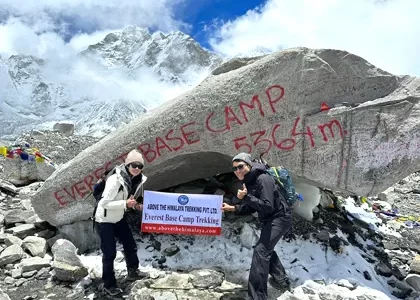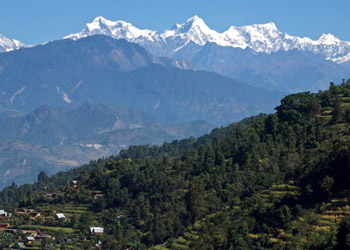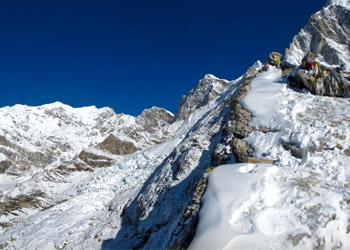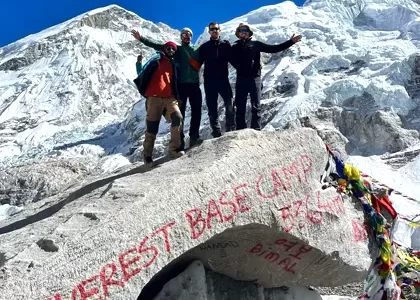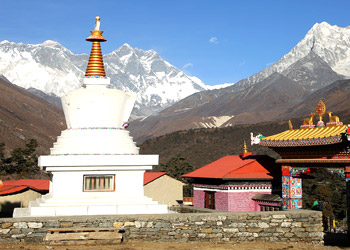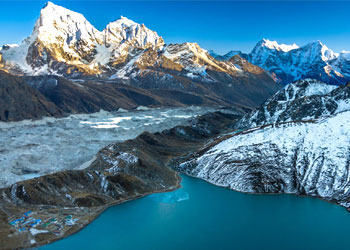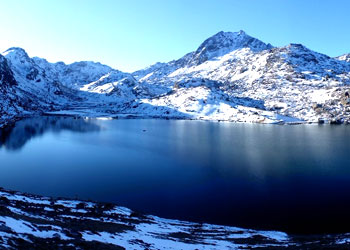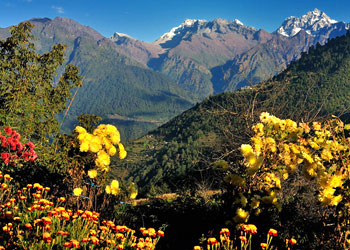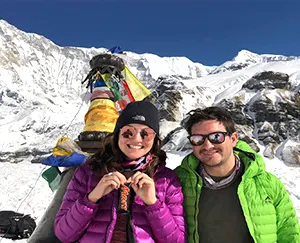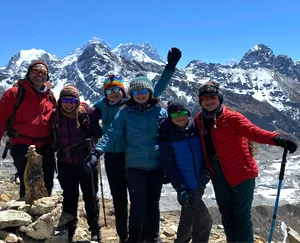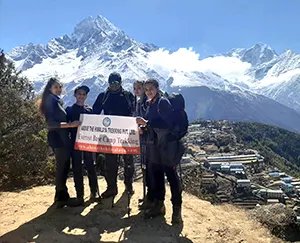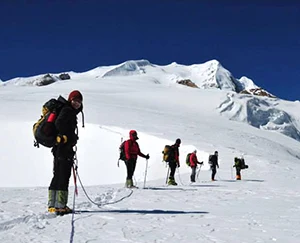How Difficult is Mera Peak Climbing
Mera Peak climbing is an enjoyable adventure and is suitable for anyone with good fitness. The difficulty of Mera Peak climbing comes mainly from the high altitude and long trekking days rather than technical climbing. There are steep parts and long walking hours on this journey to base camp, but we have a steady pace with all participants having enough rest.
The ascent to the peak is a snow walk through the glaciers, and such elementary gear as crampons, ice axe, ropes, and harnesses is used by the climbers. There are no vertical cliffs or advanced ice climbing sections, which makes it possible for first-time climbers with proper preparation. The last fifty meters to the top is the steepest part, and for safety, there is a fixed rope. Our guides will show you how to use an ascender properly so that you will feel confident.
Overall, Mera Peak climbing is moderate to challenging. You must be able to walk five to seven hours a day and be comfortable on snow. Many climbers have managed to reach the top with guidance. We will provide utility training and support. By following instructions, being focused, and preparing well, the summit experience will be extremely fulfilling and memorable.
Weather and Best Season for Mera Peak Climbing
Mera Peak climbing is the most suitable during the spring between March and May seasons and during autumn between mid-September and November. These seasons are favorable with predictable weather conditions, clear skies, and cool temperatures that are perfect when trekking and climbing the mountain.
The spring is associated with warm days and lots of daylight, with colorful rhododendrons on the trail. Autumn brings crisp air, low humidity, and spectacular mountain views after the atmosphere has been cleared by monsoon rains.
Nights are cold at high altitudes, but we will make sure you are prepared with proper clothing. Monsoon from June to August is not suitable because the trails are slippery and dangerous, and flights to Lukla may be delayed.
Winter climbing is not recommended for anything but very experienced climbers because of extreme cold and snow on high passes. Our 15-day Mera Peak climbing itinerary includes buffer days for weather changes and acclimatization.
During the Mera peak climbing best season, temperatures are between ten and twenty degrees Celsius during the day and minus five to five degrees in base camp (at lower altitudes). Summit day weather can be rapidly changing above six thousand meters, and we will prepare you for these changes. Spring and autumn are the safest and most pleasant times for your climb.
Food and Drink on the Trip
During Mera Peak climbing, we will ensure that you are well-nourished with fresh and healthy meals. Most of the trek is in teahouses that serve local cuisine. Breakfast usually consists of porridge, eggs, pancakes, toast, and tea or coffee.
Lunch and dinner are centered around hearty dishes like rice, lentils, vegetables, and noodles to obtain sufficient energy for trekking long days. The traditional Nepali meal, Dal bhat, is served in unlimited portions.
At higher elevations, the menu may be more limited, but we will ensure you are served enough as well as warm meals. During the climbing period, hot foods such as soups, porridge, and instant noodles will be prepared at High Camp. Drinking water is available from teahouses or treated streams. We will remind you to drink three to four liters per day.
Snacks like chocolate, nuts, and energy bars can be carried along the trail. Vegetarian diets can easily be accommodated, and vegan and gluten-free diets require planning, but we will help where possible. Eating well and keeping hydrated is key to a successful climb. Proper nutrition helps to maintain high energy levels and also makes sure that your body is prepared for each day of Mera Peak climbing.
Altitude Sickness & Suggestions
Altitude sickness is one of the important points to be considered while Mera Peak climbing, since the altitude of Mera Peak is six thousand four hundred seventy-six meters. We take all precautions to minimize risks by including acclimatization days in our 15 days Mera Peak climbing itinerary. Symptoms may develop above three thousand five hundred meters, such as headaches, loss of appetite, and shortness of breath.
Our guides will monitor your condition and use oximeters to monitor oxygen levels. We encourage a slow and steady pace, drinking four to five liters of water a day, and eating healthy meals.
Diamox can be used if advised by your doctor, and we will advise the correct dosage and precautions. In case of severe symptoms, descent is the safest solution, and we can arrange for assistance with porters or helicopters, if necessary.
Following our instructions, paying attention to your body, and being in a positive frame of mind will help prevent serious altitude issues. With careful management, most of the climbers make the Mera Peak climb beautifully. We will guide you every step of the way to ensure a proper acclimatization so that your health and safety are always our priority.
Preparation and Fitness Guide
Successfully reaching Mera peak climbing needs preparation. We will help you begin training 8-12 weeks prior to your trip. Focus on cardiovascular endurance activities such as running, hiking, cycling, or climbing stairs.
Strengthening of legs and core by doing squats, lunges, step-ups, and planks will assist you in coping with long trekking days. Walking with a light backpack on hilly terrains is what simulates trekking. Mental preparation is equally important; practise the use of trekking poles, the layering of clothes, and walking in boots to prevent blisters.
Familiarity with simple mountaineering equipment such as crampons and ice axes is useful. We will train you on the Mera Peak climbing itinerary, but being comfortable with your equipment boosts confidence.
A medical checkup prior to departure is recommended, particularly of the heart, lungs, or joints. The fitter you are, the more enjoyable the difficulty of Mera Peak climbing becomes. Remember, the climbing is as much mental as physical. By training well and following our advice, you will be ready to enjoy safely every step of the adventure.
Visa & Permits for Mera Peak Climbing
For Mera peak climbing, all foreigners other than Indian nationals require a visa for entry into Nepal. We will help you to get the visa on arrival at Kathmandu Airport, which requires a valid passport, one passport photo, and some cash for the visa fee.
A 15-day visa costs $30, a 30-day visa is $50, and a 90-day visa is $125. For 15 days Mera peak climbing trip, a normally 30-day visa is sufficient. Apart from the visa, a permit is required to climb Mera Peak.
We will arrange the Makalu Barun National Park permit, local area permit, and official Mera Peak climbing permit issued by the Nepal Mountaineering Association. These permits are included in the Mera Peak climbing cost, and our team will handle all paperwork, including passport photos and registrations.
Guided climbing is mandatory for the climb, and your guide will ensure that he/she carries all the official permits with him/her during the expedition. With our support, you will not have to worry about making the arrangements for permits and can focus entirely on the adventure. By traveling with our experienced team, all your visa and permit requirements for Mera Peak climbing will be smooth and hassle-free.
Health and Safety
Your health and safety are our top priority during Mera Peak climbing. We will ensure strict safety measures throughout the 15 days Mera Peak climbing itinerary. Guides are trained in wilderness first aid and have a complete first aid kit.
Early detection of any altitude problem is achieved by daily health check-ins, including oxygen saturation. Hygiene is well observed, and we advise that one only drink boiled water or treated water.
Trekking is done at a slow pace, and we make sure that the company is always together to reduce risks. On summit day, our guides will put down ropes and fixed lines where needed and ensure safe usage of the mountaineering gear.
The emergency protocols involve the immediate descent of severe symptoms or evacuation by helicopters, in case of need. High altitude trekking travel insurance is compulsory, and in the event of any emergency, we will be in contact with the high altitude trekking insurance company.
By following our guidance, pacing yourself, staying hydrated, and maintaining proper nutrition, the difficulty of Mera Peak climbing becomes manageable. With our qualified staff, you are able to concentrate on having fun on the adventure without worrying about your health and safety.
Transportation
We offer you complete transportation support for Mera Peak climbing, from the airport pick-up in Kathmandu and transfers to your hotel. Within Kathmandu, private vehicles are on call for group movements, which will assure comfort and convenience.
The domestic flight to Lukla is included and is the gateway to the trek. We will take care of flight tickets and updates, including alternative routes from Manthali if required. During the trek, the mode of transportation is by foot with the help of porters and yaks carrying heavy gear.
In exceptional circumstances, evacuation by horse or mule can be done in small quantities. After the trek, we will book a flight or other means to reach Kathmandu from Lukla or vice versa.
We take care of all the ground transfers, flights, and any logistical details, and you can focus on the 15 days Mera Peak climbing experience. Such an arrangement of transportation and thorough planning will make your trip smooth, safe, and comfortable throughout.
Travel Insurance
In the case of Mera Peak climbing, travel insurance is mandatory. We will also require evidence of trekking and climbing above 6,000 meters and emergency evacuation by helicopter.
Insurance – it will cover you financially in case of medical emergency, high altitude sickness, injuries, or evacuation expenses. Before traveling, we suggest that people purchase good insurance in case of trip interruption, medical treatment, and lost baggage.
During the 15 days Mera peak climbing itinerary, any helicopter evacuation or hospital care will be coordinated by our team in conjunction with your insurer. Insurance is not included in the Mera Peak climbing cost, but it is essential for safety and peace of mind.
When it comes to picking an appropriate policy, it is important to know that you will be able to enjoy the trek knowing they will handle the unexpected and will be able to support you through your adventure.
Alternate routes
While the standard Mera Peak climbing route from Lukla, via Zatrwa La pass, is the most popular and efficient in terms of time, there are a number of alternative routes for trekkers that want a bit more mileage, acclimatization, or a touch of adventure.
Another option that is favored is the Hinku Valley route via Panggom that enters Mera Peak via the south side. This path does not pass Zatrwa La at the start of the trek, but rather passes via Paiya, Panggom, and Ningsow to the Hinku Valley.
It adds about three extra days to the 15 days Mera Peak climbing itinerary, but offers more gradual altitude gain, rich Rai and Sherpa culture, and quieter trails. This option is ideal for trekkers concerned about the difficulty of Mera Peak climbing due to altitude.
Another advanced option is to combine Mera Peak with the Amphu Lapcha Pass and exit the Everest region. This is a demanding alpine route suitable only for experienced climbers and significantly increases both the Mera Peak climbing cost and trip duration.
Helicopter entry or exit from Khare or Kothe is also possible for those short of time, although it is no substitute for proper acclimatization. Overall, the standard route remains the best balance of safety, scenery, and success rate during the best Mera Peak climbing season.
Hidden Costs to Mera Peak Climbing
Although our package includes most of the essential things, it is important to know the possible hidden costs of Mera Peak climbing so that you can realistically plan your budget. Meals for the trek are included, but additional snacks, soft drinks, chocolate bars, or bottled water are not included.
Prices go up with altitude because supplies are carried by porters or yaks, so small purchases can add up during the 15 days Mera Peak climbing journey. We would highly recommend using purified or boiled water to reduce the cost and wasteful plastics.
Hot showers and device charging are available above 4,500m (Khare, Thagnak) but may incur additional fees. These fees vary from NPR 300-800 according to altitude and energy source.
Limited wifi or satellite internet may also be available in places like Khare or Thagnak for a fee, though reliability is low. Personal gear rental in Kathmandu, such as down jackets, sleeping bags, or climbing boots, is another potential expense if you do not bring everything required for the difficulty of Mera Peak climbing.
Tipping guides, climbing Sherpa, and porters is customary and should be budgeted separately from the Mera Peak climbing cost. Lastly, unexpected weather-related delays are typical of the season in the Mera Peak climbing, which can lead to additional accommodation or food costs. Carrying sufficient cash ensures a smooth and stress-free experience throughout your Mera Peak climbing itinerary.
Language and Communication
Mera Peak climbing provides good and comfortable communication with our team. Nepali language is the national language of Nepal, and on the trail, the majority of the people you will meet along the trail would be the Sherpa and Rai communities.
Although locals use their own dialect, the rudimentary English is commonly used in trekking regions, especially among guides, teahouse operators, and support staff. Our guides also speak good English and Nepali, and we will assist you in translations where necessary.
One does not need to speak Nepali to enjoy the trek, but it is always welcome when locals know some polite words, such as Namaste to greet a person or Dhanyabad to say thank you. These small efforts often bring about warm connections and memorable interactions. We will happily be able to teach you simple phrases along the way.
Communication with family back home can be limited during the 15 days Mera Peak climbing trip. Mobile networks are available in Kathmandu and Lukla; however, as we go deeper in the mountains, they are not reliable.
Some teahouses might have to pay for satellite internet, but it is slow and weather-dependent. We recommend informing family in advance that limited contact is normal during the Mera Peak climbing itinerary. Our office and guides are connected for safety at all times.
Mobile Network, Internet, and Charging Facilities
The availability of mobile networks and electricity is poor during Mera Peak climbing, especially after Lukla. Up to Lukla, both Nepal Telecom and Ncell networks usually work well. Beyond this point, the coverage is weak or unavailable.
In villages such as Thagnak or Khare, there may sometimes be a weak signal, but it is not reliable. For safety reasons, we will carry communication equipment in case of an emergency.
Internet services are even available at teahouses at times, using satellite connections. These services are paid, slow, and dependent upon weather conditions. They are only suitable for a short message. We advise viewing internet access as a bonus rather than a guarantee during the Mera Peak climbing season.
Charging of electronic devices is possible at teahouses for an extra charge. Since electricity is often generated from solar power, the charging times are limited. We recommend carrying a power bank and spare batteries, especially considering the cold temperatures, which quickly consume battery life. Before leaving for high camp, we will make sure all important devices are fully charged.
Being disconnected is a part of the mountain experience. Limited technology allows you to fully enjoy the landscapes and focus on the journey while following a safe and well-planned Mera Peak climbing itinerary.
Don’ts on This Trip
During Mera Peak climbing, it is very important to respect the local culture and keep one’s personal safety. We ask all of our travelers to be sensitive to local traditions.
When visiting monasteries or religious places, we will ask you to not to wear revealing clothes and behave quietly. It is a respected custom to walk clockwise around prayer walls and chortens. If you are uncertain, we will always instruct you.
Health should never be neglected when undertaking the 15 days Mera Peak climbing journey. Do not hold any altitude-related symptoms like headache or dizziness. Informing the guide early helps us manage the difficulty of Mera Peak climbing safely. It will also be highly recommended that one should not drink alcohol or smoke at higher altitudes because this can influence acclimatization.
Protecting Nature is Part of Responsible Travel. Please do not discard wastewater on trails or near water sources. We will encourage everyone to follow eco-friendly practices throughout the Mera Peak climbing itinerary. Overpacking is something else to avoid, as it is a source of stress to porters and impacts travel comfort.
Lastly, do not break off the group without notifying the guide. Flexibility and patience are essential during the Mera Peak climbing season. By following these guidelines, you have a nice, safe, meaningful, and enjoyable journey.
Trip Extension
After completing Mera Peak climbing, a lot of travelers prefer to explore further places in Nepal. If you have more time before or after the trek, we will be happy to help arrange appropriate trip extensions. Nepal has many experiences to offer, which complement the mountains perfectly.
For relaxation, Pokhara is a wonderful choice. It offers a peaceful lakeside view, and do some calm activities that will help you to recover after the 15 days Mera Peak climbing adventure. Those interested in wildlife may enjoy Chitwan National Park, where jungle safari and nature walk offer a completely different environment.
Photography and Drone Rules
Capturing memories during Mera Peak climbing is one of the most enjoyable parts of the journey. The Himalayan landscapes, glaciers, and high mountains provide endless opportunities for photography, and we completely encourage photography during the trek.
You have the freedom to take photos of mountains, trails, and trekking moments of the day. Sunrise and sunset views are especially rewarding during the Mera Peak climbing season.
We request that you respect the locals and the cultural sites when taking their photograph. Never take close-up shots without permission, particularly of the seniors or monks.
It only takes a few seconds, and asking or requesting through your guide will do. Inside monasteries, photography is frequently restricted. If photography is not allowed, we have to respect the rules and not use the flash.
The application of drones in Makalu Barun National Park is controlled, and the use of official permits is required; handheld cameras are suggested. Nepal requires official permission from several bodies to fly drones, particularly within protected areas such as the Makalu Barun National Park.
In several instances, drones are not allowed and may be seized at the airport. We generally discourage the use of drones because of legal issues, safety issues, and disturbance to wildlife and to other trekkers.
High altitude, cold temperatures, and thin air also have an impact on drone performance. For safety, legality, and peace of the mountains, handheld cameras and phones are the best option during the Mera Peak climbing itinerary.
Cultural Festivals on the Trail
Trekking in Nepal on Mera Peak climbing is not only about mountains but also about the culture and the tradition. Depending on the season of your visit, you might be able to witness local festivals that add meaningful cultural value to your journey.
The Mera route in itself is remote, but the trek starts and ends in the Solu Khumbu region, where the Sherpa culture is deeply rooted.
One significant festival is the Mani Rimdu, which is generally celebrated in the autumn. It includes colorful masked dances, prayers, and ceremonies in monasteries.
Although not directly on the Mera route, some travellers might see related celebrations before or after the climb. Another acclaimed event in the Sherpa villages is the Losar, which is the Tibetan New Year, usually in winter.
Also, during your visit, national festivals like Dashain and Tihar can be going on. The villages are alive during these festivals due to decorations, family get-togethers, and traditional rituals. Although there are services that might become a bit slow, the cultural experience is worthwhile.
It is also possible that our guides will carry out the traditional mountain blessing practices prior to the trip to the peak, in search of safe passage. Participating respectfully in these moments enriches the difficulty of the Mera Peak climbing experience and creates a deeper connection with local life.
Tips for First-Time Visit to Nepal
For first-time visitors, Nepal is welcoming and exciting, but a little preparation makes the Mera Peak climbing journey smoother. Respect for local culture is very important. Dress respectfully when in villages and religious sites, take off shoes before entering houses or temples, and greet people using the friendly Namaste.
Cash is very common in Nepal, particularly outside of cities. We recommend carrying Nepali rupees, as ATMs are limited along the Mera Peak climbing itinerary. Maintain small notes to cover the day-to-day costs. Safe drinking water is required. Avoid raw tap water and use purified or bottled water.
Traffic in Kathmandu can be anarchy, so be a careful walker. While trekking, listen to your guide, and don’t walk alone. Nepal is relatively safe, but it is a good idea to keep valuables safe.
Take a reusable water bottle and reduce plastic waste to preserve the environment. Bargaining is very common in tourist places, and should never be done without courtesy.
Cities are covered by the internet and mobile, but it is scarce in the remote trekking regions. Patience is key. It is not always that things will go as planned, and during the actual Mera Peak climbing season, flexibility will allow you to have the best time on the journey.
Luggage Limit Porter Weight Restrictions
Packing light is necessary for a good and comfortable 15 days Mera Peak Climbing. Flights to Lukla have strict limits on the weight of baggage, typically around 15 to 20 kilograms, including hand carry. We recommend that non-trekking items be left safely at your hotel in Kathmandu.
During the trek, porters transport much of your luggage. One porter normally carries the luggage of 2 climbers, so one should restrict their duffel bag to around 10 to 12 kilos. This helps to protect the health of the porters, as well as ensuring ethical trekking practices. You will be carrying a daypack containing water, snacks, a jacket, a camera, and essentials.
Heavy items such as the climbing gear and sleeping bags are taken care of by our team. Overpacking adds unnecessary strain and increases the difficulty of Mera Peak climbing. Re wearing of clothes is normal on trek, and quick-dry clothes are best.
Use waterproof bags and little locks for extra security. If your luggage is heavy, our team will assist you in reorganizing your luggage before departure. Packing thoughtfully improves comfort and supports fair porter treatment throughout the Mera Peak climbing itinerary.
Mera Peak vs Island Peak vs Lobuche Peak, which is Better?
Choosing between Mera Peak, Island Peak, and Lobuche Peak depends on your goals and experience. Mera Peak climbing is the highest of the three, and it is regarded as the least technical. It focuses more on endurance and altitude rather than advanced climbing skills. The views from Mera are broad and encompass a number of eight-thousand-meter peaks.
Island Peak is a little lower but more technical. It has steeper snow sections as well as fixed ropes. It is often combined with Everest Base Camp, and this combination has made it popular but crowded. Of the three mountains, Lobuche Peak is the most technical and is best for experienced climbers.
For beginners, 15 days Mera Peak climbing is often the best choice in terms of better acclimatization and a safer climbing route. Island and Lobuche are better for those who want technical challenges.
Cost-wise, all three are similar, albeit permits vary. If your priority is altitude and moderately technical scenery, Mera is ideal. If you wishfor Everest region exposure, Island Peak suits well. Lobuche is for the self-assured climber looking for a challenge. Each of the peaks is a rewarding Himalayan experience.
Is Mera Peak suitable for Beginners?
Yes, Mera Peak climbing is suitable for beginners, but with good fitness and experience of trekking. There are no previous mountaineering skills required. The ascent is not characterized by steep ice walls or complicated technical sections. Our guides offer you full training at base camp on how to use crampons, ice axe, harness, and ropes.
The greatest difficulty is altitude, not technical difficulty. At an altitude of 6476 meters, acclimatization is crucial. Our Mera Peak climbing itinerary includes rest days to help your body adjust safely. Beginners need to be able to walk for several hours a day and be mentally strong in cold conditions.
We closely monitor health and pace throughout the climb. Many of the climbers reach the summit successfully as their first Himalayan peak. Following the guide instructions and a steady pace is the thing.
Although suitable in the case of beginners, it is important to prepare. Pre-trip cardio training and hiking will also make the Mera Peak summit a little easier. With the right guidance and determination, beginners can bravely embark on this rewarding adventure.
Solo Mera Peak Climbing – Is It Allowed?
Climbing Mera Peak solo, without having any support, is not allowed as per the Nepal regulations. Climbing permits must be issued through a registered agency and require the assistance of a licensed guide. This rule is there for safety and legal reasons.
However, for solo travelers, there is an option to join a private climb with their own guide and porter team. This option is common and ideal for those who favor personal space but still have professional support. All the permits, logistics, and safety measures are organized by our team.
Attempting to climb alone without assistance is risky because of crevasses, weather changes, and altitude risks. Carrying full gear alone also makes a big difference in increasing physical strain. The difficulty of Mera Peak climbing becomes much higher without local support.
We do strongly recommend guided climbs for safety and success. A private solo arrangement still provides the independence, but guarantees legal compliance and emergency support. This way, you have the best of both worlds – adventure for yourself and also responsible mountaineering.
Mera Peak Climbing Without Previous Mountaineering Experience
Climbing Mera Peak without prior experience as a mountaineer is possible and quite common. This peak is often selected as a first introduction to high-altitude climbing. You do not need any previous technical skills since our guides give the training during the trek.
At base camp, we teach key skills such as how to use crampons, how to walk on snow, and how to operate safety gear. Our team takes care of route finding and rope fixing so you can concentrate on the climbing itself and do it steadily.
Physical fitness and mental strength are more important than experience. Summit day is long and demanding, and altitude can be a challenge. Proper acclimatization in the 15 days Mera Peak climbing schedule helps to reduce risks.
Open communication with guides is a must. If you are feeling low or unsure, our team is there to support you. At the end of the climb, you will have gained valuable experience and confidence. Mera Peak is an ideal starting point for future climbs of the Himalayas.
Mera Peak Climbing Age Limit and Requirements
There is no strict maximum age for Mera Peak climbing, but fitness and health is what matters more than age. The suggested minimum age is about 16 years (usually under parental supervision). Younger climbers must be physically strong and mentally ready.
Older climbers in their 50s and 60s are seen making regular successes on Mera Peak. Medical clearance is recommended, particularly for heart or respiratory problems. Good joint health and stamina are important for long days of trekking.
All climbers must declare medical conditions and have insurance to cover high altitude evacuation. Mental determination is just as important as physical strength during the Mera Peak climbing season.
We take every climber individually in our team and can advise on extra acclimatization days. Age alone is not a limitation to success. With proper preparation, people of many age groups can safely complete the Mera Peak climbing itinerary.
Best Mera Peak Itinerary Options (Standard vs Short)
The standard 15 days Mera Peak climbing itinerary is the safest and most recommended option. It includes gradual ascent, acclimatization days, weather, and buffer time. This schedule provides a high summit success rate as well as a more enjoyable experience.
Shorter itineraries of 12 days do exist, but are only suitable for climbers with recent high altitude experience. These routes involve longer trekking days and fewer rest days, increasing the difficulty of Mera Peak climbing.
The lack of acclimatization increases the chances of altitude sickness and reduces the flexibility in the event of weather change. Helicopter-assisted itineraries reduce time but add cost, and are at the mercy of the weather.
For climbers in general, the standard itinerary offers the best compromise of safety, comfort, and success. We can accommodate pacing if necessary; however, we strongly recommend against rushing. Give your body time – it is the best investment for a successful and memorable Mera Peak climbing experience.
Cultural lovers can spend more time in the Kathmandu Valley. Visits to Bhaktapur and Patan give you the chance to explore history, art, and traditional architecture. These experiences add cultural depth to your Mera Peak climbing itinerary without physical strain.
If you are still looking for adventure, we can also help you to explore more trekking/sightseeing options based on your energy level and time schedule. All extensions are planned keeping your comfort, time, and Mera Peak climbing cost considerations in mind.
Trip extensions also act as buffer days in case of weather delays during the Mera Peak climbing season. We will tailor everything according to your interests in order to make your experience in Nepal complete and rewarding.
Common Risks in Mera Peak Climbing
Mera Peak climbing occurs in a high Himalayan environment where natural risks exist, and knowledge of these risks is an important part of preparation. One of the most common is altitude sickness.
On the way up, trekkers climb well above 3,000 meters, and it is possible to experience symptoms such as headache, nausea, dizziness, or loss of appetite. In extreme cases, hypothermic arrest and cerebral hypoxia (HACE) or hypoxia pauperum (HAPE) may develop in case of symptom disregard.
Because of this, our Mera Peak climbing itinerary is designed with gradual ascent and acclimatization days. Our guides conduct frequent health tests, check oxygen, and promote open communication in order to conceal nothing under the carpet.
Another risk that is common is slipping or falling. Certain sections of the trail, especially when crossing Zatrwa La Pass or walking on the glacier terrain, can be icy or uneven. During the summit climb, climbers are roped together, and the correct use of crampons and an ice axe minimizes the dangers immensely. The weather is another factor that affects the difficulty of Mera Peak climbing.
Unexpected snow, wind, or whiteout conditions may lead to greater risks of cold-related injury, including frostbite or hypothermia. Our team is highly vigilant in following the forecasts and planning.
There is also a possibility of crevasses on the glacier, physical exhaustion, dehumanization, and human error. These are regulated through good pacing, water reminders, a rope system, and continuous supervision.
Under the guidance of the experienced team, safety gears and strict teamwork, the dangers in the 15 days Mera Peak climbing are well taken care of, and the climb is not hazardous but attainable.
Weather Related Delays & Contingency Plans
Weather plays a big role during Mera Peak climbing, and sometimes, due to weather conditions, it is unavoidable to skip a day. One of the most common disturbances is flights (to and from Lukla or Ramechhap), which rely heavily on visibility.
Even during the best Mera Peak climbing season, flights may be delayed or canceled due to clouds or wind. For this reason, our itinerary includes a contingency day to deal with such situations without rushing the climb.
If the flight delays last for more than one day, alternative options can be considered. Helicopter flights are sometimes possible, where fixed-wing aircraft cannot operate, although they are dependent on weather and add extra cost. In exceptional circumstances, a change in route or exit plans may be necessary to ensure that travelers safely catch international flights.
Weather can also impact the trek and attempt to summit itself. Severe snowfall, high or low wind, or visibility conditions can result in an additional day in base camp or high camp. In case the situation is not safe at the peak, the guide will postpone it or cancel it. Safety always comes before the summit, regardless of the Mera Peak climbing cost or schedule.
Our guides are updated on the weather frequently and are flexible with plans. With buffer days, other logistics, and good communication, we are able to navigate weather-related challenges effectively while keeping the safety of the climb a priority.
What Makes Mera Peak Special Among Nepal’s Peaks
Mera Peak climbing is different from other climbing peaks in Nepal for several reasons. At an elevation of 6,476 meters, it is regarded as the highest trekking peak in the country, as it presents the possibility to climbers to achieve extreme altitude without the use of advanced technical climbing. This makes it a perfect objective for those looking for a proper Himalayan challenge without the high technical level.
One of the most unique things about Mera Peak is the panoramic view from the summit. From the top, climbers can sight five of the world’s highest mountains, including Everest, Lhotse, Makalu, Cho Oyu, and distant Kanchenjunga on a clear day. There is no other trekking peak that gives such a broad Himalayan panorama in a single place.
Another special feature is the remote approach to Hinku Valley. Unlike Everest trails, which are so crowded, this route goes through the quiet forests, alpine valleys, and small settlements, and provides an authentic sense of wilderness. This remoteness adds to the adventure and reduces crowd pressure, even during peak Mera Peak climbing season.
Mera Peak also has the flexibility of routes. Can be combined with longer treks or difficult passes, so it can be varied depending on the goal. Due to its altitude and accessibility, it is frequently used as preparation for higher expeditions, which makes 15 days Mera peak climbing a meaningful stepping stone in a mountaineering expedition.
Views from Mera Peak Summit (8000m Mountains Seen)
Standing atop the peak during Mera Peak climbing offers one of the most memorable mountain views in the Himalayas. From this lofty position, climbers are surrounded by an enormous panorama of snow-covered giants that stretch across Nepal and beyond.
Looking north and northwest, Mount Everest rises above the horizon, and Lhotse lies close to its side. Slightly to the west, Cho Oyu, with its broad snout of snow, is visible close to the Tibet border.
Turning east, Makalu dominates the skyline in its sharp pyramid shape, appearing surprisingly close. On exceptionally clear days, the distant outline of Kanchenjunga can be seen far to the east to complete the view of five 8000-meter peaks seen from a single summit.
Apart from these giants, climbers also witness Baruntse, Chamlang, Nuptse, and many 7000 and 6000-meter peaks around Hinku and Hongu valleys. Glacial lakes and long ridgelines stretch far below and highlight the isolation of the summit.
Because the Mera Peak climbing itinerary schedules the summit attempt early in the morning, climbers often witness sunrise lighting the Himalayas in golden colors. This unparalleled panorama is commonly considered to be one of the best rewards of the climb and a defining point of the entire journey.

![]() General
General![]() Preparation & Fitness
Preparation & Fitness![]() Permits
Permits![]() Insurance and Visa
Insurance and Visa![]() Guides & Support Staff
Guides & Support Staff![]() Accommodation and Facilities
Accommodation and Facilities![]() Food and Drinks
Food and Drinks![]() Weather & Seasons
Weather & Seasons![]() Health & Safety
Health & Safety Enjoy Himalayan scenery with the help of Nepal’s best guides with Government license holders and got training in first-aid, our Trip Leaders, know where you’ll find the best photos, most fascinating wildlife, and the best stream crossings.
Enjoy Himalayan scenery with the help of Nepal’s best guides with Government license holders and got training in first-aid, our Trip Leaders, know where you’ll find the best photos, most fascinating wildlife, and the best stream crossings.
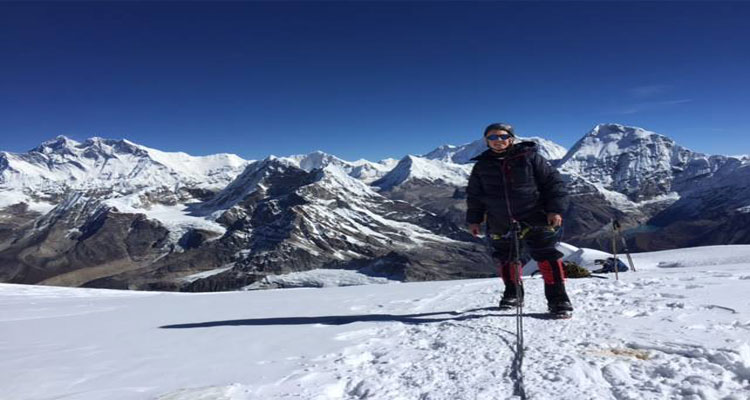
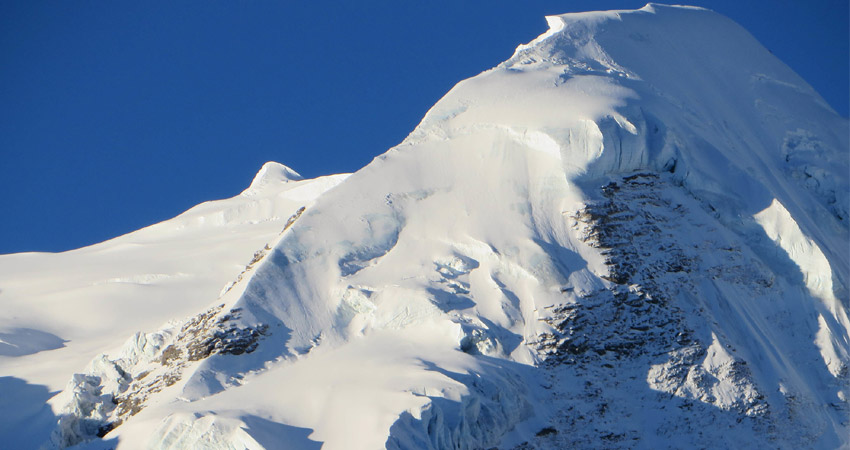




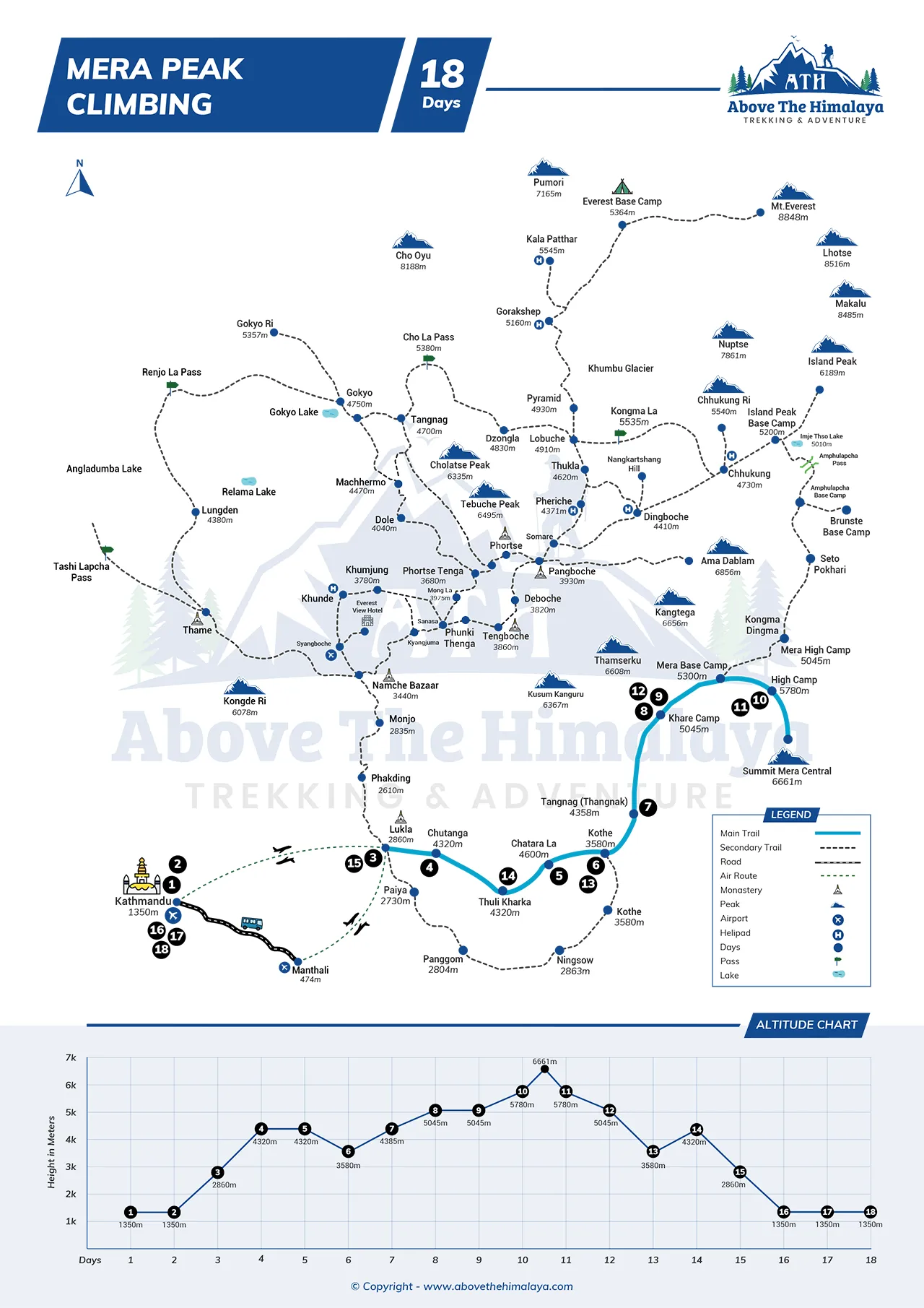

 Have Questions?
Have Questions?